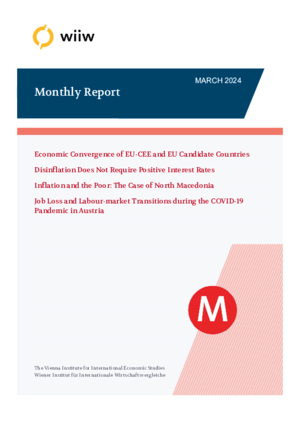Monthly Report No. 3/2024
Stefan Jestl, Branimir Jovanović, Ambre Maucorps, Leon Podkaminer and Maryna Tverdostup
wiiw Monthly Report No. 3, March 2024
33 pages including 7 Tables and 8 Figures
Current issues accessible exclusively for Members. Free access after an embargo period of six months.
- Chart of the Month: Economic convergence of EU-CEE and EU candidate countries
by Ambre Maucorps
- Opinion Corner: Disinflation does not require positive interest rates
by Leon Podkaminer
In recent years, there has been no shortage of calls for a radical tightening of monetary policy in response to high inflation. However, both history and recent developments in the euro area countries cast doubt on the uniform wisdom of such a response, suggesting that inflation can moderate just as well if real interest rates are in negative territory.
- Inflation and the poor: The case of North Macedonia
by Branimir Jovanović
We estimate that the number of people living in extreme poverty in North Macedonia rose by 21-43% between 2021 and 2023. Similarly, the number of people living in moderate poverty increased by between 21% and 28%. This massive rise in poverty levels can be attributed to the fact that price increases outpaced the growth in income for many people. Although this analysis specifically addresses North Macedonia, the findings are likely to hold for other countries where this has been the case.
- Job loss and labour-market transitions during the COVID-19 pandemic in Austria
by Stefan Jestl and Maryna Tverdostup
The COVID-19 pandemic had a profound and uneven impact on employment in Austria, with female workers, those born abroad and individuals with a lower level of education proving the most susceptible to the changes. Immigrant women and mothers who lost their job during the pandemic faced prolonged unemployment and a reduced chance of securing full-time work afterwards. Surprisingly, our data suggest that – unlike in other countries – poorly educated and younger workers in Austria do not face a severe disadvantage when re-entering the job market.
- Forecasts of main economic indicators for Central, East and Southeast Europe for 2024-2026
Reference to wiiw databases: wiiw Annual Database, wiiw Monthly Database
Keywords: economic convergence, inflation, real interest rates, absolute poverty, moderate poverty, COVID-19 pandemic, unemployment, labour market transition
Countries covered: EU-CEE, Austria, EU candidate countries, Euro Area, North Macedonia
Research Areas: Macroeconomic Analysis and Policy, Labour, Migration and Income Distribution
